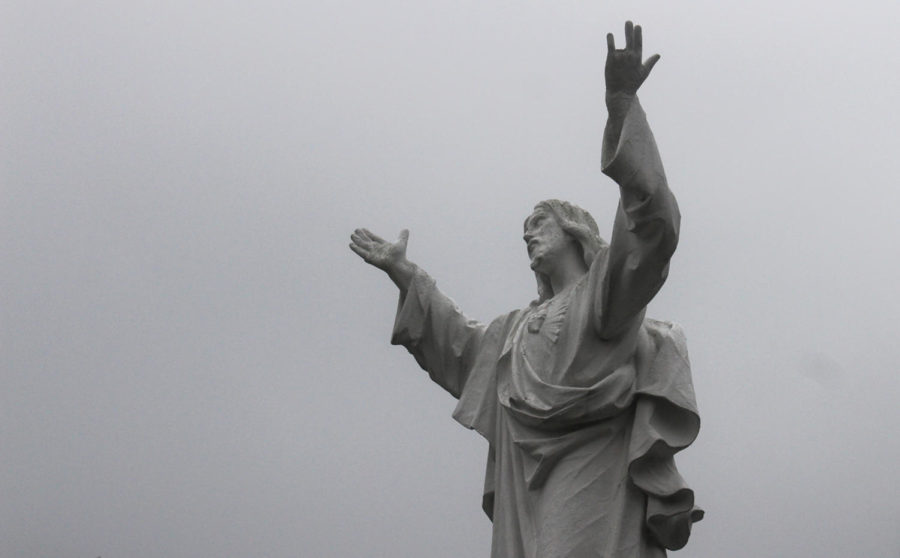Jesuit High comes to term with past history of sexual abuse
The Jesus statue in the Horseshoe stands alone on rainy Nov. 7, 2018. Loyola raised $1.2 million to give bonuses to long-term faculty members.
November 13, 2018
The Archdiocese of New Orleans looked to make amends for past sexual abuses accusations. On Sept. 19, The New Orleans Advocate published a story alleging repeated sexual abuse and rape of Richard Windmann, a minor at the time, by Peter Modica, a janitor at Jesuit High School in the 1970’s.
The Advocate reported that six years ago, Windmann and Jesuit High settled on a $450,000 payment in retribution for the abuses he endured. This settlement came around the time that Jesuit settled two other abuse cases from the same era. These involved Donald Dickerson, a Jesuit in training, and Claude Ory, a Jesuit brother.
Fr. Christopher Fronk, S.J., President of Jesuit High, wrote a letter to his community shortly after the publication of The Advocate article. He began with a word of thanks to those who reached out to him for “showing a genuine concern for victims.”
Fronk made sure to clarify Jesuit High’s adherence to Archdiocesan policies regarding sexual abuse.
“Jesuit’s policies are completely consistent with ones in place for the Archdiocese of New Orleans. Both have as a primary source the Charter for the Protection of Children and Young People,” Fronk wrote.
Regarding confidentiality in abuse settlements, Fronk quoted Article 3 of the Charter for the Protection of Children and Young People.
“Dioceses are not to enter into settlements which bind the parties to confidentiality, unless the victim or survivor requests confidentiality and this request is noted in the text of the agreement,” the Charter reads.
He quoted the charter again, this time Article 1, regarding care for survivors of abuse.
“Dioceses are to reach out to victims/survivors and their families and demonstrate a sincere commitment to their spiritual and emotional well-being. The first obligation of the Church with regard to the victims is for healing and reconciliation.”
Earl Johnson, ’13 alumnus of Jesuit High School, spoke of his reaction to The Advocate article.
“My initial reaction was that this was an old story,” he said. “ I was angry. How could this happen and no one talk about it? My anger turned to sadness. I didn’t know how to talk about it.”
Johnson recalled his own days at Jesuit, calling them “academically tough” but “socially and spiritually great.”
He shared his experience with the Jesuits and the effects that they had on him.
“The Jesuit priests were spiritual leaders. I never had any sense of worry or fear toward them,” he said. “I converted to Catholicism my senior year.”
Johnson praised Fronk’s letter and handling of the situation and spoke of the strength of the Jesuit High community.
“Fr. Fronk has done a great job,” Johnson said. “Our community is strong. We have hope. Leadership from Fr. Fronk and the school has been strong. I’m confident that this will never happen again on his watch.”
Sexual abuse by members of the Catholic clergy has been a hot topic of late. A Pennsylvania Grand Jury report from July of this year identified credible allegations of sexual abuse against over 300 priests in Pennsylvania.
This set off a frenzy of media coverage on the dealings of the Church in the United States, and prompted many American bishops to issue letters to the people they serve and lists of credibly accused employees.
Archbishop Gregory Aymond of New Orleans has been active in confronting sexual abuse within the Archdiocese of New Orleans. He issued several letters, most recently publishing a list of all clergy members, alive and deceased, who either admitted to abusing minors or were accused of doing so.
In open letters published June 22nd, August 15th, and November 2nd of this year, Archbishop Aymond made reference to the Charter for the Protection of Children and Young People, a set of policies established by the United States Conference of Catholic Bishops in June of 2002.
Under the Charter, every employee of every Catholic parish, school, or other entity in the United States must go through child protection training. In the Archdiocese of New Orleans, this is called Safe Environment training.
Sr. Mary Ellen Wheelahan is the Safe Environment Coordinator for the Archdiocese of New Orleans.
“As Safe Environment Coordinator for the Archdiocese of New Orleans, I know there is so much pain resulting from the abuse crisis. It is so important that we be attentive to those who are survivors/victims of abuse,” Wheelahan said.
“All of our clergy, employees and volunteers are mandated reporters in the State of Louisiana. The reporting would be to either the Department of Children and Family Services or to the Police.”
Wheelahan made clear that programs are evaluated and updated each year, regardless of whether or not scandals break out.
“The grand jury report form Pennsylvania was not a catalyst for our making changes in our program,” Wheelahan said. “We make changes to our Safe Environment program each year based on the Charter for the Protection of Children and Young People, the laws for the State of Louisiana and from our experiences throughout the archdiocese.”
“Our program is strong. The strength is due to our clergy, administrators, staff, parents and volunteers who give of their time to learn what child abuse is, the signs of abuse and how to report alleged abuse to authorities.”
Wheelahan and Johnson both made clear the importance of being there for survivors.
“My hope is that we can be part of the healing process for survivors and their families,” Wheelahan said.
“The victim needs to be respected and able to negotiate as they wish, whether that lead to confidentiality or publicity,” Johnson said.
Fronk ended his letter by assuring the Jesuit community of his commitment to preventing abuse in the future.
“Vigilance remains my number one priority in moving the Jesuit community forward. That is my job right now, moving us forward by ensuring the safety of current students and the entire Jesuit High School community,” he wrote.
Johnson shared a desire to confront the crimes rather than run from them.
“Don’t forget about it. We’re part of what happened thirty years ago. It’s within our community. It hurts. Always keep the faith, and keep strong within yourself,” he said.
To those questioning their trust in the Church and in their own priests, Johnson had a message of encouragement and hope.
“The Church is two thousand years old. It’s been through many hardships,” Johnson said.
“Remember those moments when your faith pulled you through – moments praying the Rosary, going to Adoration, serving others – the happy moments that drew you in,” he continued.
His final message was to those who haven’t been directly affected by clergy abuse.
“Always keep the faith, and keep strong within yourself,“ he urged. “Those of use on solid ground have to help those who are struggling. We have to walk with them.”







